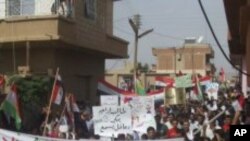U.N. Secretary-General Ban Ki-moon says the international community has a "moral obligation" to prevent further bloodshed in Syria, a day after a European-drafted resolution aimed at curbing the violence failed at the U.N. Security Council.
A spokesman said Wednesday that Mr. Ban sees the violence as unacceptable and regrets that the Security Council has not come to an agreement on how to end it.
Russia and China vetoed a resolution draft written by France, Britain, Germany and Portugal Tuesday, sparking U.S. and European outrage. The measure contained possible references to sanctions against Syria if its leader pursues a crackdown on opposition protesters.
Meanwhile, Turkish Prime Minister Recep Tayyip Erdogan said during a speech in South Africa Wednesday his government will impose its own sanctions on Syria, despite the resolution's failure at the U.N. Security Council.
U.S. State Department spokeswoman Victoria Nuland said the vote does not change U.S. commitment to increase pressure on the Syrian government. She said countries will have to take responsibility for the decisions made Tuesday and any impact it may have on the ground in Syria.
French Foreign Minister Alain Juppé said France and others tried everything possible to propose a strong resolution that reflected everyone’s concerns about what he called the "massacring" of the Syrian people. He said Tuesday was a "sad day" for the Syrian people and the U.N. Security Council.
However, a senior aide to the Syrian president told the French news agency that Tuesday was a "historic day." Bouthaina Shaaban told AFP in Damascus that Russia and China stood "with the Syrian people" and provided the time needed for the government to "enforce and enhance reforms."
Syria has been using military force to crush almost seven months of opposition protests demanding an end to Syrian President Bashar al-Assad's 11-year autocratic rule.
The United Nations says at least 2,700 people have been killed in the crackdown against protesters and other dissidents.
Turkey has provided refuge for several Syrian dissidents. A Syrian colonel who found refuge there and heads the armed opposition force called the Free Syrian Army said a brutal crackdown last week in Rastan was an operation to capture him.
Colonel Riad al-Asaad says he defected in July after refusing to follow Syrian government orders to shoot protesters. He says his opposition group now has more than 10,000 defectors.
Some information for this report was provided by AP and AFP.




